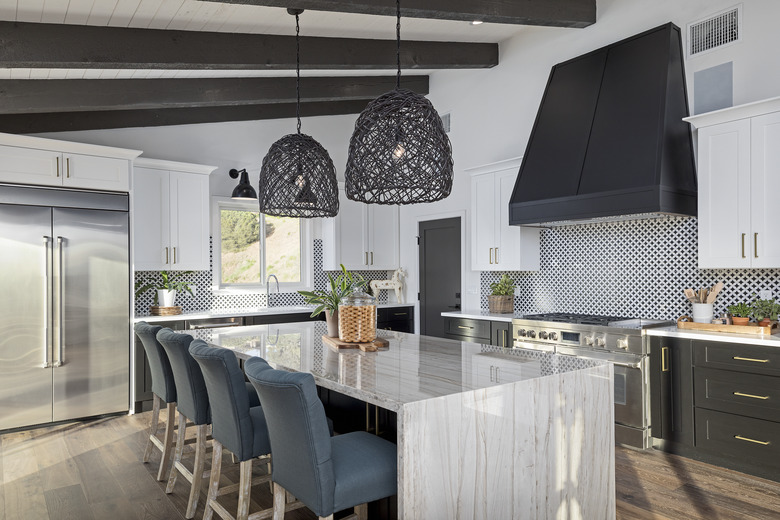How Thick Are Countertops?
Renovating a kitchen — or building one from scratch — can be overwhelming in many ways. You probably have an idea in your head of exactly what you want, but suddenly, you have to figure out nitty-gritty details like countertop thickness. But don't stress.
Figuring out the best thickness for your new kitchen countertops will help you build a kitchen that will hold up against all your activities and help you avoid buying materials that are too thin or low quality. Learning more about the different types of countertops and the importance of thickness can help you determine which materials and dimensions are best for you.
Tip
Countertop thickness depends on material. Quartz and stone countertops are generally 2-3 cm thick (about an inch) while laminate countertops are usually 1 1/2 inches thick.
Types of Countertop Materials
Types of Countertop Materials
Before you know how thick your countertop should be, you must decide which material you'd like to use. There are several factors to consider when deciding on material, including budget, personal preference and how you'll be using the countertops. Each material has its advantages based on these considerations:
- Quartz: Quartz countertops are popular because they're durable and super easy to take care of. Many people also love the look of quartz since it often resembles natural, marbled stone. One potential drawback is the price. High-quality cuts of it can become quite pricey, although thanks to its durability, it's usually a great investment. Quartz typically refers to an engineered stone that's often sold under brand names including Pental Quartz, Caesarstone, Cambria and Silestone.
- Granite: Though expensive, granite is a popular choice for countertops because of its resilience and durability. It's heat-resistant, can hold up against slicing and dicing kitchen activity and comes in a wide variety of vibrant colors.
- Laminate: The general term laminate typically refers to plastic laminate material often sold under the brand name Formica. This is usually the most affordable option for countertops. It comes in a wide range of colors and cut-to-fit sheets that typically mean you don't have to wait around for months for your countertops to show up from an overseas factory. It's relatively durable but far more susceptible to scratches and damage from heat than tougher materials such as granite.
- Marble: Known for its striking appearance, this is a popular countertop choice, but aesthetics are its biggest strength. Marble is relatively soft and porous, so it's quick to stain and scratch.
Determining Countertop Thickness
Determining Countertop Thickness
Countertop thickness is measured in centimeters, and the right thickness for you will depend on which material you've chosen.
Quartz countertops are most commonly 2 or 3 centimeters. These are both thick enough to remain stable without as much support from the foundation beneath the countertop, though 3 centimeters has become the industry standard. If you see a 4 centimeters countertop or even higher, it likely means that the body of the countertop is 2 centimeters, but two or more additional centimeters have been applied to the edges to give the appearance of a thicker countertop. Because this requires more work and materials, it's costlier and is largely the reason that a solid 3 centimeters countertop has become the standard.
It has also become the standard with granite because for a countertop more than 24 inches, 2 centimeters granite would need a plywood base to fortify it atop the cabinets. That also requires a laminate finish to hide the plywood, which adds to the cost. For a cabinet that's smaller than 24 inches, however, it's possible to have a 2 centimeters granite without plywood.
Laminate Countertop Dimensions
Laminate Countertop Dimensions
Unlike granite and quartz, laminate comes in sheets that are typically measured in inches. Laminate sheet thickness can depend on the type of laminate you're buying, but the standard is 1.5 inches. This is thick enough to be supported atop the cabinets but also thin enough to keep costs down for a budget-friendly redesign.
If you prefer a thicker laminate countertop, you can work with your fabricator to create overhangs along the edges to make it appear as though the entire countertop is thicker.
Take your time to decide which material and thickness are right for you so you can enjoy your kitchen for years to come.
